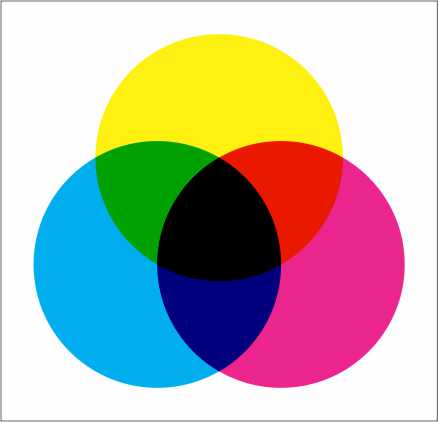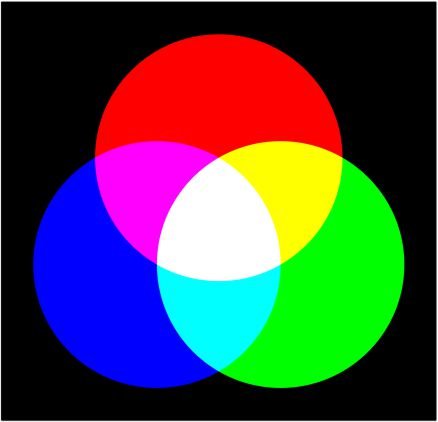
Addition and Subtraction
Many of us were taught as children that the primary colors are Red, Yellow, and Blue. It is often simplified in this way for children. I myself suffered from this incorrect color model for many years! Many students never learn anything different, often never having needed to take a class which covered the correct models.
There are two basic color models: additive and subtractive. Subtractive is used in pigments, and the primaries are Magenta, Yellow, and Cyan--the secondaries thereof are as follows:

- Yellow and Magenta = Red
- Magenta and Cyan = Blue
- Cyan and Yellow = Green
The reason this is, is because your eyes actually see only three colors of light:

Think of pigments as light-absorbents: a Cyan pigment absorbs Red, and so Cyan consists of Blue and Green being reflected-which your mind understands as Cyan. When you mix Cyan(absorbs Red) with Magenta(absorbs Green), you end up with only Blue being reflected.
This is why printers use CMYK, a subtractive color model. In CMYK, there is a Black pigment added to enhance shading, as it is next to impossible to match CMY perfectly into black. It is this same inequality between pigments that causes there to often be a discernible difference between an image seen on a screen, and the same image having been printed. The map of available colors based on any given set of pigments or light sources is called a "Color Space".
Inversely, when discussing light, you are discussing additive color, wherein you could take a Red light, and a Blue light, and when you shine them both at the same piece of White paper, you see Magenta.
In theatrical or concert lighting, we often use RGBW LED fixtures that have a Red, Green, Blue, and White LED. The white LED serves the same purpose in lighting as the Black(or key) pigment serves in printing: it is incredibly difficult and tedious to balance the R, G, and B lights to create a perfect White, and it also allows for more possibilities in highlighting people and objects on the stage.

P.S.While we're at it, check out @ksolymosi's excellent series on the Psychology of Color: https://steemit.com/psychology/@ksolymosi/the-psychology-of-colours-part-1-introduction

The Sauces:
Great summary!
Yes, many people do not know that there are two types of colour models and that we construct black and white by addition and subtraction.
I was painting quite a lot, so I am quite used to mixing pigments, but it must be a completely different issue to mix lights. Once I saw a theatre performance where the light technician wasn't on top, all of the actors on stage looked like zombies... though it was a classic Shakespeare play and they probably intended to create sunny daylight... it was quite funny...
Resteemed your post, it is a good addition to my series! :-)
Downvoting a post can decrease pending rewards and make it less visible. Common reasons:
Submit
Thank you for resteeming!
Haha, yeah you can make humans look all sorts of weird! Harsh angles, no diffusion, blacklights(especially with the right costumer and a good make-up artist), too much green, or a dark red. It gets pretty strange out there.
Funny side note, there's a color-filter(or "gel" as we call them) used quite often for late afternoon sunlight or to imitate old oil lamps and it goes by the name "Bastard Amber".
Downvoting a post can decrease pending rewards and make it less visible. Common reasons:
Submit
Good name - LOL
Downvoting a post can decrease pending rewards and make it less visible. Common reasons:
Submit
Thanks for interesting article! I had always suspected the lighting techs were onto something...
Downvoting a post can decrease pending rewards and make it less visible. Common reasons:
Submit
Haha! We have a few tricks up ye olde sleeve!
;-)
Downvoting a post can decrease pending rewards and make it less visible. Common reasons:
Submit
Yeah, all this time I thought you were all high and trying to blind us!
Downvoting a post can decrease pending rewards and make it less visible. Common reasons:
Submit
Ahahaha! No that's the Followspot Ops... Technically they're a kind of lighting tech, but they're more like if you gave Arnold Schwarzenegger a spotlight and told him it was a machine gun. Except, the stage is the jungle, and you're the alien he's trying to kill.
Downvoting a post can decrease pending rewards and make it less visible. Common reasons:
Submit
Lol, too good!
Downvoting a post can decrease pending rewards and make it less visible. Common reasons:
Submit